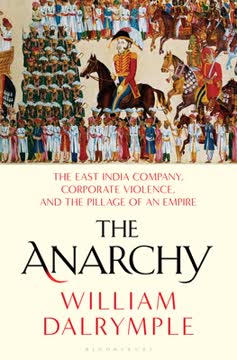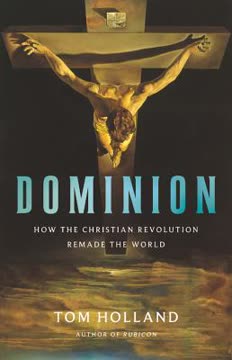Key Takeaways
1. The British Empire began through piracy and evolved into a global trading network
It was not conceived by selfconscious imperialists, aiming to establish English rule over foreign lands, or colonists hoping to build a new life overseas. Morgan and his fellow 'buccaneers' were thieves, trying to steal the proceeds of someone else's Empire.
From pirates to traders. The British Empire's origins can be traced to the activities of privateers and buccaneers who targeted Spanish and Portuguese colonies and trade routes. These early efforts were not part of a grand imperial design but rather opportunistic ventures seeking to profit from existing empires.
Evolution of trade networks. As the British gained footholds in various regions, they established trading posts and colonies. The East India Company, founded in 1600, played a crucial role in developing British interests in Asia. These commercial enterprises laid the foundation for a vast network of trade that would eventually span the globe.
Key early developments:
- Privateering against Spanish and Portuguese ships
- Establishment of trading posts in India and the Caribbean
- Creation of chartered companies like the East India Company
- Gradual transition from piracy to legitimate trade and colonization
2. Sugar and slavery fueled the Empire's early economic success
The rise of the British Empire, it might be said, had less to do with the Protestant work ethic or English individualism than with the British sweet tooth.
Sugar and slavery. The cultivation of sugar in the Caribbean colonies became a cornerstone of the British Empire's early economic success. This lucrative trade relied heavily on the labor of enslaved Africans, creating a triangular trade system between Britain, West Africa, and the Americas.
Economic impact. The profits generated from sugar production and the slave trade fueled Britain's industrial revolution and financed further imperial expansion. This economic model, while morally reprehensible, provided the capital and resources necessary for Britain to become a global power.
Key aspects of the sugar-slavery economy:
- Establishment of sugar plantations in the Caribbean
- Forced migration of millions of enslaved Africans
- Development of the triangular trade system
- Accumulation of wealth by British merchants and plantation owners
- Financing of industrial development in Britain
3. The American Revolution challenged British imperial power
It was the moment when the British ideal of liberty bit back. It was the moment when the British Empire began to tear itself apart.
Rebellion and independence. The American Revolution marked the first major challenge to British imperial authority. The conflict arose from tensions between the colonists' desire for self-governance and Britain's attempts to exert control over its North American territories.
Imperial rethinking. The loss of the American colonies forced Britain to reassess its approach to colonial governance. This led to the development of new strategies for maintaining imperial control, such as the concept of "responsible government" introduced in Canada following the Durham Report of 1839.
Lessons learned from the American Revolution:
- Need for greater colonial autonomy
- Importance of addressing grievances before they escalate
- Recognition of the limits of military power in maintaining control
- Development of new models of colonial administration
4. Technological advancements and financial innovations enabled global dominance
It was a triumph based on naval superiority. But this in turn was possible only because Britain had one crucial advantage over France: the ability to borrow money.
Technological edge. Britain's industrial revolution and technological advancements, particularly in naval and military technology, gave it a significant advantage over rival powers. Innovations such as steam power, the telegraph, and improved weaponry allowed Britain to project power globally.
Financial innovations. The development of sophisticated financial institutions and instruments, such as the Bank of England and government bonds, enabled Britain to finance its imperial ventures more effectively than its competitors. This financial flexibility was crucial in sustaining long-term military campaigns and colonial administration.
Key technological and financial advantages:
- Steam-powered ships and railways
- Telegraph networks for rapid communication
- Advanced weaponry (e.g., Maxim gun)
- Establishment of the Bank of England
- Development of a robust government bond market
- Creation of joint-stock companies for colonial ventures
5. Evangelical Christianity and the abolition of slavery reshaped imperial ideology
The Evangelicals sought to secure its abolition. From now on, the aim became to improve them. Native peoples themselves would cease to be exploited, but their cultures – superstitious, backward, heathen – would have to go.
Moral transformation. The rise of evangelical Christianity in Britain led to a significant shift in imperial ideology. The abolition of the slave trade and slavery became a moral imperative, transforming the Empire's self-image from one of exploitation to one of moral improvement and civilizing mission.
Civilizing mission. This new ideology justified imperial expansion as a means of bringing Christianity, commerce, and civilization to "backward" peoples. While often well-intentioned, this approach led to the suppression of indigenous cultures and the imposition of British values and institutions.
Elements of the new imperial ideology:
- Abolition of slavery throughout the Empire
- Emphasis on missionary activity
- Promotion of Western education and values
- Justification of imperial rule as a moral duty
- Increased focus on "improving" colonized peoples
6. The "scramble for Africa" marked the peak of British imperial expansion
Never in human history had there been such drastic redrawing of the map of a continent. By 1914, apart from Abyssinia and Liberia (the latter an American quasi-colony), the entire continent was under some form of European rule. Roughly a third of it was British.
Rapid expansion. The late 19th century saw a dramatic increase in British territorial acquisitions in Africa. This was part of a broader European "scramble" for African territories, driven by economic, strategic, and prestige considerations.
Imperial zenith. By the early 20th century, the British Empire had reached its greatest territorial extent, encompassing nearly a quarter of the world's land surface and population. This period marked the height of British imperial power and influence on the global stage.
Factors driving the "scramble for Africa":
- Economic interests (raw materials, markets)
- Strategic concerns (controlling key trade routes)
- Prestige and competition with other European powers
- Technological advantages (e.g., quinine, Maxim gun)
- Ideological justifications (civilizing mission, Social Darwinism)
7. World War I strained the Empire's resources and exposed its vulnerabilities
Considering the vast differential between the resources of the two empires, the only real puzzle is that it took the British Empire so long to win.
Global conflict. World War I was a true test of the British Empire's strength and cohesion. The conflict required the mobilization of resources and manpower from across the Empire on an unprecedented scale.
Imperial strain. While ultimately victorious, the war exposed vulnerabilities in the imperial system and placed enormous strain on Britain's economic and military resources. The conflict accelerated changes in the relationship between Britain and its colonies, particularly the Dominions.
Effects of World War I on the British Empire:
- Massive mobilization of colonial troops and resources
- Increased autonomy for Dominions (e.g., separate representation at Versailles)
- Economic strain and accumulation of war debt
- Shifts in global power dynamics (rise of US and Japan)
- Erosion of Britain's technological and industrial advantages
8. Post-war doubts and economic challenges led to the Empire's gradual decline
Loss of faith in Empire often went hand in hand with loss of faith in God.
Crisis of confidence. In the aftermath of World War I, many British elites began to question the morality and practicality of imperial rule. This loss of faith in the imperial project was reflected in literature, popular culture, and political discourse.
Economic challenges. The interwar period saw Britain struggle to maintain its global economic dominance. The costs of the war, the disruption of international trade, and the rise of new economic powers like the United States all contributed to a relative decline in British economic power.
Factors contributing to imperial decline:
- Growing nationalist movements in colonies
- Economic challenges and loss of competitive edge
- Shifts in public opinion and elite attitudes towards empire
- Rise of alternative powers (US, Soviet Union)
- Costs of maintaining global imperial commitments
- Changing international norms regarding colonialism
Last updated:
FAQ
What's Empire: The Rise and Demise of the British World Order and the Lessons for Global Power about?
- Historical Overview: The book provides a detailed exploration of the British Empire's rise, expansion, and eventual decline, highlighting its vast control over territories and populations.
- Global Power Dynamics: It examines the implications of British imperialism on contemporary global power, particularly focusing on the United States as the "heir to the Empire."
- Complex Legacy: Ferguson addresses both the positive and negative aspects of the Empire, including economic benefits and moral costs like slavery and exploitation.
Why should I read Empire by Niall Ferguson?
- Comprehensive Analysis: Ferguson offers an in-depth analysis of the British Empire, essential for understanding modern global politics and historical context.
- Engaging Narrative: The book combines historical facts with personal anecdotes and vivid descriptions, making it accessible and engaging for a wide audience.
- Contemporary Relevance: It raises important questions about imperialism and governance, encouraging readers to reflect on the past's impact on the present.
What are the key takeaways of Empire?
- Dual Nature of Imperialism: The book illustrates how imperialism brought both modernization and exploitation, highlighting its complex legacy.
- Economic Motivations: Ferguson emphasizes that economic interests, such as the demand for resources and markets, were primary drivers of imperial expansion.
- Legacy and Lessons: Understanding the Empire's legacy is crucial for navigating current global challenges, particularly in relation to American foreign policy.
What are the best quotes from Empire and what do they mean?
- "The British Empire was the biggest Empire ever, bar none.": This underscores the vastness and significance of the British Empire in world history.
- "How did an empire of the free become an empire of slaves?": This highlights the paradox of British imperialism, where ideals of freedom coexisted with slavery.
- "The legacy of the Empire is not just ‘racism, racial discrimination, xenophobia and related intolerance’.": Ferguson argues that while these negative aspects are undeniable, the Empire also contributed to global capitalism and parliamentary institutions.
How does Niall Ferguson address the moral implications of the British Empire?
- Moral Complexity: Ferguson acknowledges the Empire's moral complexities, recognizing its brutality alongside its contributions to governance and society.
- Critique of Justifications: He critiques the moral justifications used to support imperialism, emphasizing their often self-serving nature.
- Lessons for Today: The moral implications offer valuable lessons for contemporary global politics, encouraging reflection on historical injustices.
How does Empire connect the British Empire to the United States?
- Historical Roots: The book discusses how the U.S. emerged from British colonial rule, highlighting the lasting impact of British governance and culture.
- Imperial Legacy: Ferguson argues that the U.S. has inherited both the benefits and burdens of the British Empire in its role as a global power.
- Contemporary Questions: The author raises critical questions about whether the U.S. should embrace or reject its imperial legacy in foreign policy.
What role did economic factors play in the British Empire's expansion?
- Resource Acquisition: Economic factors were crucial, as Britain sought resources and raw materials from its colonies, fueling conflicts and shaping policies.
- Market Expansion: The Empire provided new markets for British goods, essential for sustaining economic growth during the Industrial Revolution.
- Financial Investments: Investments in colonies were motivated by profit potential, leading to infrastructure that facilitated further expansion.
How does Ferguson define imperialism in Empire?
- Complex Definition: Imperialism is defined as a multifaceted phenomenon encompassing economic, political, and cultural dimensions, beyond mere territorial conquest.
- Historical Context: Ferguson places imperialism within a historical context, discussing its evolution and changing motivations over time.
- Moral Implications: He addresses the moral implications, acknowledging its exploitative nature while noting its role in modernization and development.
What does Empire say about the legacy of colonialism?
- Mixed Legacy: Ferguson presents a nuanced view, acknowledging both positive and negative impacts, including exploitation and modernization.
- Continued Influence: The legacy continues to shape global relations, affecting governance, economic disparity, and cultural identity.
- Cultural Exchanges: Colonialism facilitated cultural exchanges, creating complex identities and relationships that persist today.
How did the Boer War influence British politics according to Empire?
- Shift to the Left: The Boer War led to a political shift towards the Left, with public outrage over its brutality galvanizing anti-imperialist sentiments.
- Emergence of New Movements: It catalyzed new political movements challenging the established order, impacting British governance.
- Critique of Imperialism: The war prompted a reevaluation of imperialism, increasing scrutiny of its moral and ethical implications.
What role did technology play in the expansion of the British Empire?
- Military Superiority: Technological advancements in weaponry, like the Maxim gun, allowed British forces to dominate conflicts.
- Communication and Transport: Innovations such as the telegraph and steamships facilitated faster communication and troop movement.
- Economic Exploitation: Technology enabled resource extraction and infrastructure establishment, benefiting British economic interests.
What is the significance of the Berlin Conference in the context of Empire?
- Partition of Africa: The Berlin Conference formalized Africa's division among European powers, setting the stage for the Scramble for Africa.
- Legitimization of Claims: It established the principle of ‘effective occupation’, allowing powers to claim territories based on control ability.
- Impact on Indigenous Peoples: The conference disregarded African nations' rights, leading to exploitation and resistance against colonial rule.
Review Summary
Empire receives mixed reviews. Some praise Ferguson's balanced approach and engaging writing, while others criticize his pro-imperial stance and romanticization of British rule. Readers appreciate the book's insights into the empire's global impact but note its Anglo-centric perspective. Many find it thought-provoking, even if they disagree with Ferguson's conclusions. Critics argue he downplays colonial atrocities and overemphasizes positive legacies. Overall, reviewers acknowledge the book's comprehensive overview of British imperial history but remain divided on its interpretation and message.
Similar Books







Download PDF
Download EPUB
.epub digital book format is ideal for reading ebooks on phones, tablets, and e-readers.











